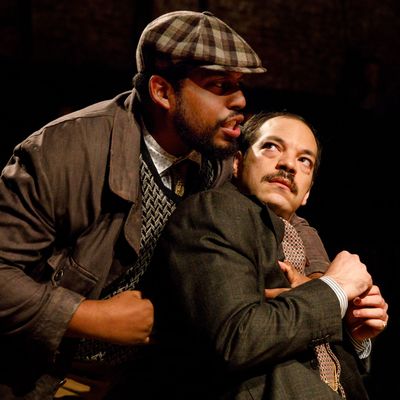
There must be something good in the water in Providence, Rhode Island. Something that encourages the growth of playful, ambitious but unpretentious, actor-and-text-driven theater companies. In the past decade, graduates from the Brown/Trinity Rep MFA acting program have formed at least two such ensembles — scrappy, smart, bighearted troupes that have managed to find a foothold in New York’s not-always-so-nurturing theatrical terrain. They even have similar chaos-embracing names: Bedlam (whose offbeat Peter Pan you can still catch until Christmas) and Fiasco Theater, currently in residence at Classic Stage Company with a charming, unfussy take on Twelfth Night, or What You Will.
Shakespeare’s tale of tempest-tossed twins washed ashore in a land of excess — excess of love, of wine, of ego, of melancholy — is arguably his greatest comedy. It certainly has the greatest subtitle, suggesting the generous, expansive, flexible heart of the piece. Written to be performed as court entertainment during Epiphanytide — the feast of Twelfth Night traditionally falls on the fifth or sixth of January — the play has the feeling of the seasons turning, the bright awakening of a new year even in the midst of winter’s long dark days. That brightness is its heroine, Viola, a catalyst for life and love dropped into the middle of a country that’s hibernating in its own self-indulgence. Her first words, having been separated from her twin brother, Sebastian, in a shipwreck and cast upon a foreign shore: “What country, friends, is this?”
“This is Illyria, lady,” replies the sea captain who helped her reach dry land. And so Shakespeare begins a kind of fairy tale, a story of mistaken identity and heady desire in an imaginary kingdom, where the character in disguise is in fact the most honest, open, and noble soul of all.
Honest, open, and noble — it’s also a fitting description for Fiasco’s good-natured production. The show — co-directed by Noah Brody, who plays the Duke Orsino, and Ben Steinfeld, who makes a marvelous Feste — has the feeling of what those with merit badges in Shakespeare Nerdery call “original practices”: a method of approaching Shakespearean performance that, as far as we can tell, closely mirrors the style of Elizabethan companies like the playwright’s own King’s Men (in the U.S., the technique’s staunchest proponent is the American Shakespeare Center in Staunton, Virginia). Its elements: An open, flexible stage with audience on three sides (bonus points for a balcony area), a lighting design that allows actors constant communication with the audience (no fourth wall to speak of), lots of live music created by the ensemble, lots of doubling of roles, and, rather than a director (a role that hadn’t been invented yet), an actor-manager or two, crafting the performance’s final shape from both inside and out.
And Brody and Steinfeld strike me as skilled actor-managers. This Twelfth Night isn’t the work of an auteur — no overarching concept has been attached to the production. The aesthetic is tried-and-true, springing naturally from a story of storms, both of the sea and of the heart: the set by John Doyle (CSC’s artistic director) is a reconfigurable combination of ropes, steamer trunks, and old furniture. Emily Rebholz’s simple, effective costumes conjure up a kind of Illyria-as-Nantucket, but not overinsistently so (cable-knit sweaters and waders exist happily alongside black morning coats and smoking jackets). There’s no heavy stylistic signature on the work — instead, Fiasco’s priorities seem to spring from the mindset of actors who deeply love Shakespeare and long to communicate this material’s great gifts and joys. Brody, Steinfeld, and their fellow ensemble members value textual clarity, enthusiastic storytelling, and energetic forward motion (the production is two-and-a-half hours long but feels swift and buoyant throughout).
This is excellent gateway-drug Shakespeare, and I mean that as sincere praise. We’ve reached a point where even the nation’s preeminent Shakespeare companies seem to think that the work of the playwright they’ve made millions on isn’t really accessible; where prestigious artists are tackling Shakespeare without actually believing he can be understood; where, at least once a year, someone thinks they’re being really cool by releasing a snarky op-ed encouraging theaters to stop producing Shakespeare’s plays. Yes, there’s a lot of Bad Bard out there. Newsflash: There’s a lot of bad theater in general. Companies like Fiasco are like Adam Savage and Jamie Hyneman, doing the yeoman’s work of mythbusting Shakespeare’s so-called inaccessibility. In the show I saw, watching the delighted faces of audience members in the front row — from a young boy near me to a white-haired gentleman with a cane across the theater — was almost as entertaining as following the story of Viola and the rest of the gang. These people understood. Fiasco’s actors used the language not as a barrier to keep us out, but as a prism — complex and many-sided but ultimately illuminated and illuminating.
Steinfeld, as the smart clown Feste, is particularly gifted when it comes to cracking open Shakespeare’s text. He lifts it up and shows it to us with a mischievous half-grin, like it’s a fascinating toy he’s discovered and wants to share. Along with Viola, he’s the play’s heart: another honest character hiding behind a mask, his the façade of licensed foolery (Viola, who’s working for Orsino in the cross-dressing habit of a page named Cesario, is sporting a more literal disguise). Steinfeld’s got an instant, easy rapport with the audience, and he’s in fine voice for the delivery of several of Shakespeare’s loveliest, most plaintive songs (not to mention accompanying himself on guitar). Also immediately appealing are Emily Young — who captures Viola’s open-eyed, heart-forward integrity without turning it into naïvete — and Jessie Austrian, a co-artistic director of Fiasco who plays a sweet, vibrant Olivia, the countess-next-door who refuses to return Orsino’s passionate overtures.
Below-stairs, Andy Grotelueschen makes a heartily amusing Sir Toby Belch, Olivia’s drunken hanger-on of an uncle. Tipsy in a nubby sweater and a disheveled avuncular beard, he gives the impression of an English professor after too much punch at the faculty Christmas party. As his partner in crime, the housekeeper Maria, Tina Chilip is wonderfully feisty, and as their nemesis, the “sick of self-love” steward Malvolio, Paul L. Coffey effectively makes the transitions from stick-up-the-butt self-righteousness to amorous silliness to sympathetic suffering.
This Twelfth Night doesn’t always drive into the play’s emotional extremes. There’s an evenness of temper about the piece, an avoidance of peaks and valleys in favor of a quick, bright clip towards the finish line. The company is dedicated to inviting an audience in and keeping us merrily afloat on Shakespeare’s varying seas. Scenes that another director might push toward disturbing darkness (like Malvolio’s eventual rough treatment at the hands of Sir Toby and company) or elevate into make-you-cry-and-maybe-pee-a-little hysteria (the antics of Toby and his foppish flunky Sir Andrew Aguecheek; the “gulling” of Malvolio) here ask for our lively engagement but don’t leave us stricken or wet-trousered. Despite their name, Fiasco perhaps plays things a bit on the safe side tonally, but all in all, it’s “a most happy wreck.” And, as Feste might say, “that’s all one.”





